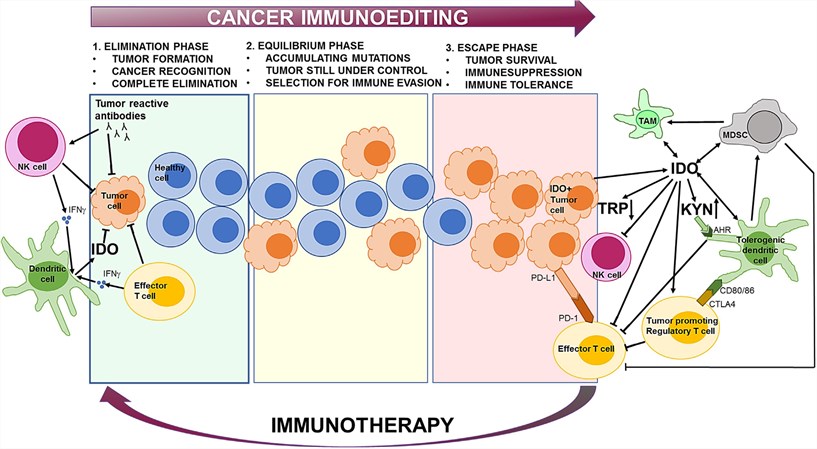Indoleamine 2,3-dioxygenase 1(IDO-1), the most broadly expressed catalytic enzyme, is a tryptophan catabolizing enzyme that catalyzes the initial and rate-limiting step in the conversion of tryptophan to kynurenine. IDO-1 is recognized as a checkpoint controller in several physiopathology conditions and exerts a potent immune-suppressive effect through local inhibition of T lymphocytes and other immune cells.
IDO-1 is inducible in monocyte-derived (myeloid), macrophages, plasmacytoid dendritic cells by interferons, and other pro-inflammatory signals also are expressed in a variety of different cells like mesenchymal stromal cells, endothelial cells, fibroblasts, and tumor cells. Functionally, IDO-1 expression by tumor cells and myeloid cells can catalyze tryptophan into kynurenine and destroy T cells by impairing essential amino acids. Furthermore, high levels of IDO-1 are not only associated with poor prognosis in some malignancies but may also be involved in drug resistance to chemotherapeutic agents.
Cells that express IDO-1 create two effects in the milieu around them: depletion of the essential amino acid tryptophan and production of a series of kynurenine pathway metabolites. Both of these IDO-1 effects have immunoregulatory properties in normal and pathological conditions. As tryptophan deprivation can inhibit the proliferation of T cells, IDO-1 could represent an effective escape mechanism by which tumors might evade immune surveillance. Thus, IDO-1 has recently become an attractive new target in therapeutic interventions aimed at restoring the immune response towards the tumor.
 Fig.1. The role of IDO1 in cancer immunoediting.1,2
Fig.1. The role of IDO1 in cancer immunoediting.1,2
With the exciting development and advance of checkpoint inhibitors, enormous attention has been raised on the IDO1 as a metabolic mediator of immune escape in cancer. From a therapeutic standpoint, drugs that inhibit IDO potentially represent a novel class of immunomodulatory agents, targeting a pathway that might be involved mechanistically in the ability of tumors to evade the host immune system. The emphasis of the current preclinical and clinical trials has focused on the combination strategy using IDO-1 inhibitors with other immunotherapy agents or chemotherapy. In preclinical models, blockade of IDO-1 using small molecule inhibitors combined with other immune checkpoint blockade induces prominent anti-tumor effects, and reversal of tumor-associated immunosuppression appears to be dependent on host IDO-1 expression. Diverse early phase trials investigating IDO inhibition and other compounds alone or in combination are underway.
As an experienced expert in immune checkpoint therapeutics, Creative Biolabs provides comprehensive custom services for the efficient development of potential immune checkpoint IDO-1 agents for our global customers, including but not limited to:
Please do not hesitate to contact us for more detailed information.
References
All listed customized services & products are for research use only, not intended for pharmaceutical, diagnostic, therapeutic, or any in vivo human use.
USA
Tel:
Fax:
Email:
Copyright © 2026 Creative Biolabs. All Rights Reserved.